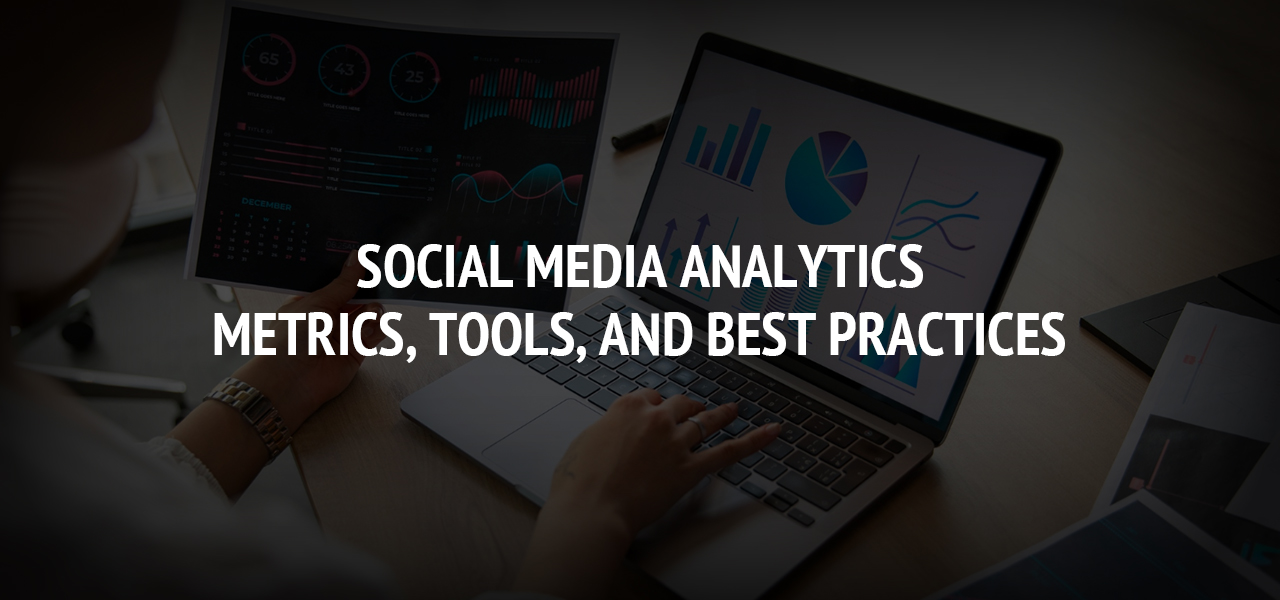Social Media Analytics: Metrics, Tools, and Best Practices

What is social media analytics?
Social media analytics is the analysis of data about comments and discussions made on social media platforms besides formally structured data collected for decision-making purposes. This is done by following conversations, marketing campaign analysis, and determining how social media endeavors affect business outcomes.
It should be noted that the best companies using customer experience metrics also address social media analysis with surveys, ratings, review data, call centers, and other sources of information about the customer. They are highly effective because this general view of customer experience and sentiment analysis help brands and companies to get a complete picture and understand how clients think about them.
Benefits of social media analytics
- Improved customer insights: Social media analytics provide an in-depth look at how customers feel about your brand, products, and services. This information can significantly influence product strategy and brand reputation.
- Enhanced ROI: Businesses can better understand customer needs by analyzing social media data alongside customer feedback from various channels, leading to more effective brand strategies.
- Informed decision-making: With a clear view of customer sentiments and interactions, businesses can make strategic decisions that align with customer preferences and behavior.
- Trendspotting: Social media analytics helps identify trends and predict consumer behavior, informing overall business strategy.
Social media intelligence vs. Social media data
Social media data encompasses metrics collected from social platforms, including likes, shares, mentions, and impressions. This data provides a quantitative view of user interactions with content.
Social media intelligence refers to the methodologies used to monitor social channels and interpret social media data. It includes the practice of social listening, which goes beyond tracking metrics to understand audience sentiment and context.
The role of social listening
Social listening goes beyond the mere collection of metrics and contains a holistic perspective of how it fits with the bigger scheme of things in the business world. Ultimately, businesses need to know audience feelings and responses to be able to strategically influence decisions concerning product design, operations, and general plans.
To achieve this, organizations can leverage one of the top social listening tools to gather insights from various platforms, facilitating a more comprehensive understanding of customer sentiment.
Social media analytics in customer experience management
To effectively utilize social media analytics, organizations should align their analytics efforts with customer experience management strategies. What remains important is the exploration of a causal relationship where social media channels are seen in terms of enabling specific business goals to be met in terms of boosting the customer experience and interaction levels with a brand.
Key features of effective social media analytics tools
When selecting a social media analytics tool, businesses should consider the following features:
- Multi-channel analysis: It should be able to analyze numerous social media platforms; this would assist the business in establishing the overall brand reputation.
- Dashboards and visualization: Useful analytics should be equipped with user interfaces, which will allow the presentation of the desired data as clearly as possible for a variety of personnel and departments.
- Sentiment analysis: The ability to perform advanced sentiment analysis is crucial. This feature helps brands gauge audience emotions beyond basic engagement metrics.
- Emotion analysis and effort scoring: Tools should be capable of analyzing customer emotions and assessing the effort required to interact with the brand, providing valuable insights into customer loyalty and potential churn.
- Segmented data: Analytics tools should allow for audience segmentation to better understand interactions and feelings toward the brand.
- Operational data integration: The best analytics tools can pull in operational data to correlate social media activities with sales, web traffic, and other key metrics.
Key Performance Indicators (KPIs) for social media analytics
KPIs are critical for measuring the success of social media management. They help assess performance across various channels and determine whether marketing goals are achieved.
Defining social media KPIs
Social media KPIs are specific metrics that evaluate engagement, reach, traffic, conversions, and customer sentiment.
Why Track KPIs?
- Identify successful strategies: By experimenting with various strategies and tracking KPIs, brands can determine the most effective approaches for their marketing goals.
- Measure performance: KPIs help assess the effectiveness of ads, posts, and campaigns, providing insights into audience engagement and conversion.
- Analyze social sentiment: By closely monitoring customer reactions, brands can glean insights into overall sentiment and brand perception.
Types of social media KPIs
- Brand awareness KPIs: Impression and reach together with share of voice assist in the calculation of brand awareness.
- Engagement KPIs: Engagement metrics, such as likes, comments, shares, and clicks address the extent of customers’ engagement with content.
- Conversion KPIs: Metrics such as conversion rate, and click-through rate (CTR), will give an idea of how effective the call to action is.
- Customer experience KPIs: Overall brand perception and customer loyalty are indicated by the collection of the overall customer satisfaction scores and Net Promoter Scores.
Specific reach KPIs
- Impressions: The total number of times content appears on users' screens.
- Post reach: The number of unique users who viewed a post.
- Web traffic: Measures clicks that redirect users to a brand's website.
- Share of voice: Compares brand mentions against competitors to assess market visibility.
Specific engagement KPIs
- Number of clicks: Tracks interactions with content, indicating engagement levels.
- Likes, shares, and comments: Fundamental metrics that gauge audience response.
- Brand mentions: Counts how often the brand is mentioned across platforms.
- Social shares: Measures how many times content is shared, reflecting audience approval.
- Average engagement rate: A formula that assesses overall engagement relative to follower count.
Challenges in social media analytics
While social media analytics offers significant advantages, organizations may face several challenges:
1. Data privacy and compliance
Businesses have to consider diverse privacy regulations such as the GDPR and Cal-CCPA. Nowadays, it is crucial to see to it that social media analytics practices meet the legal requirements of the respective countries and the International laws in particular.
2. Data silos and integration
Companies employ many platforms for analysis which become isolated and fragmented. It is crucial for a single source of completion, and businesses should configure tools that offer integrated data reporting.
Final Thoughts
Social media analytics are the backbone of assessing customer sentiments, channeling business approaches, and improving customers’ experience. It hence becomes evident that if data is properly harnessed, corporations can assist their clients as well as gain their approval to excel in business.
Thus, strengthening analytical instruments and tactics for providing brands with high performance, it will be critical for the further development of SM as an effective promotional platform in the context of the permanent change in consumers’ preferences and technological opportunities.
About The Author
Related Blog
View All-
The feature of deep linking in various types of in app notifications
Developers and marketers of mobile apps may successfully communicate with their users by sending them in-app alerts. The ability to leverage deep linking in different types of in app notifications is crucial, as it enables users to quickly and easily access relevant ...
-
Must-Have Apps for the International Freelance Worker
Having the right tools is very important for any freelancer to produce his best work. As a freelancer, you have to manage different tasks, work expenditure and productivity all by yourself. However to do your freelancing job successfully it is important to make ...







